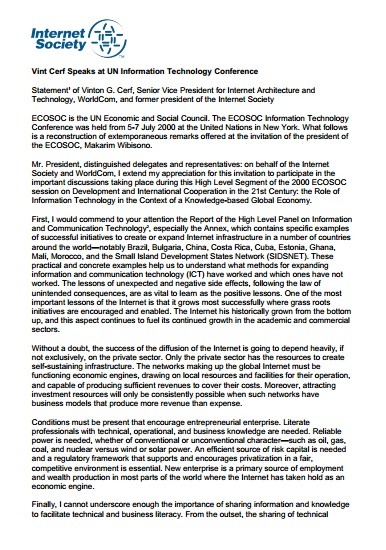Statement of Vinton G. Cerf, Senior Vice President for Internet Architecture and Technology, WorldCom, and former president of the Internet Society
ECOSOC is the UN Economic and Social Council. The ECOSOC Information Technology Conference was held from 5-7 July 2000 at the United Nations in New York. What follows is a reconstruction of extemporaneous remarks offered at the invitation of the president of the ECOSOC, Makarim Wibisono.
Mr. President, distinguished delegates and representatives: on behalf of the Internet Society and WorldCom, I extend my appreciation for this invitation to participate in the important discussions taking place during this High Level Segment of the 2000 ECOSOC session on Development and International Cooperation in the 21st Century: the Role of Information Technology in the Context of a Knowledge-based Global Economy.
First, I would commend to your attention the Report of the High Level Panel on Information and Communication Technology2, especially the Annex, which contains specific examples of successful initiatives to create or expand Internet infrastructure in a number of countries around the world—notably Brazil, Bulgaria, China, Costa Rica, Cuba, Estonia, Ghana, Mali, Morocco, and the Small Island Development States Network (SIDSNET). These practical and concrete examples help us to understand what methods for expanding information and communication technology (ICT) have worked and which ones have not worked. The lessons of unexpected and negative side effects, following the law of unintended consequences, are as vital to learn as the positive lessons. One of the most important lessons of the Internet is that it grows most successfully where grass roots initiatives are encouraged and enabled. The Internet his historically grown from the bottom up, and this aspect continues to fuel its continued growth in the academic and commercial sectors.
Without a doubt, the success of the diffusion of the Internet is going to depend heavily, if not exclusively, on the private sector. Only the private sector has the resources to create self-sustaining infrastructure. The networks making up the global Internet must be functioning economic engines, drawing on local resources and facilities for their operation, and capable of producing sufficient revenues to cover their costs. Moreover, attracting investment resources will only be consistently possible when such networks have business models that produce more revenue than expense.
Conditions must be present that encourage entrepreneurial enterprise. Literate professionals with technical, operational, and business knowledge are needed. Reliable power is needed, whether of conventional or unconventional character—such as oil, gas, coal, and nuclear versus wind or solar power. An efficient source of risk capital is needed and a regulatory framework that supports and encourages privatization in a fair, competitive environment is essential. New enterprise is a primary source of employment and wealth production in most parts of the world where the Internet has taken hold as an economic engine.
Finally, I cannot underscore enough the importance of sharing information and knowledge to facilitate technical and business literacy. From the outset, the sharing of technical knowledge has been critical for the rapid proliferation of the Internet. Openness is vital if technology and policy are to be transferred from Internet-experienced countries to less experienced ones. To the extent than any country gains experience with the Internet, that experience needs to be accessible—through the World Wide Web, among other media—to virtually everyone.
1 As the last speaker of the session, Dr. Cerf had only about 3 minutes to make his remarks.
2 This is the report from a panel of experts convened in fulfillment of General Assembly Resolution 54/231, “The role of the United Nations in promoting development in the context of globalization and interdependence,” which requested the Secretary General to convene a high-level panel of experts on information and communication technology. The panel met at the Headquarters of the United Nations from 17-20 April 2000. Dr. Cerf participated in part of this panel discussion as the representative of ICANN at the invitation of the chairman of the panel, Nii Quaynor, and the UN panel facilitator, Chuck Lankester.
